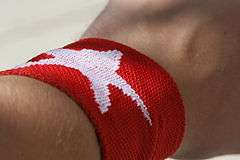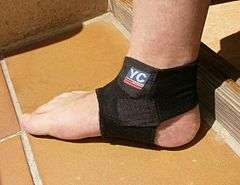Wrist brace

A wrist brace is a garment that is worn around the wrist to protect it during strong use or for allowing it to heal.[1] Wrist braces are common accessories in injury rehabilitation processes affecting the wrist.[2] They immobilize the joint and provide heat and compression to the wrist bones and ligaments. Currently, they are made with a rigid tissue nylon fabrics[3] or neoprene that allows limited mobility of the hand and wrist and are usually fixed with Velcro, some times with extensions to ensure they cover part of the hand adhering around thumb. In severe cases, they incorporate metal "spines" to better immobilize the joint.
Uses

They are indicated for wrist trauma without fracture, immobilization of the joint, postoperative synovitis, recurrent degenerative sprains or articulation inflammations, among many other cases.[4]
In rehabilitation to immobilize the wrist into a neutral position, which "theoretically minimizes stress at the repair site".[2]
Use in sports
The wrist braces have a protective role in activities where wrists require extraordinary effort like weight lifting or bodybuilding.[4] In these cases, using pressure around the wrist may prevent sprains and strains.
Finally, are used in sports which force the wrist play, as those played with a paddle or racket[4] (tennis, paddle, badminton) or hockey. Some times they have a double purpose: protect the wrist from injuries and wipe the sweat from the forehead. For this purpose are made in absorbent materials such as cotton or plush.
In artistic gymnastics, gymnasts will sometimes wear wrist guards, often referred to as 'Panda Paws' to absorb the impact on the skills they perform. The guards are commonly worn for Vaulting and Floor exercises. The design is modified between women and men.
-

Tennis Player with wrist brace
-

Weight lifter with wrist brace
-
Rugby player with wrist brace
-

Ankle brace
-
Wrist brace
See also
References
- ↑ Mary Vining. Radomski; Catherine A. Trombly Latham (2008). Occupational therapy for physical dysfunction. Lippincott Williams & Wilkins. pp. 430–. ISBN 978-0-7817-6312-7. Retrieved 25 May 2013.
- 1 2 David J.. Slutsky; Daniel J.. Nagle (2007). Techniques in wrist and hand arthroscopy. Elsevier Health Sciences. pp. 52–. ISBN 978-0-443-06697-9. Retrieved 25 May 2013.
- ↑ Beskeen; Duffy; Elizabeth Eisner Reding; Friedrichsen (2 February 2011). Microsoft Office 2010 for Medical Professionals Illustrated. Cengage Learning. pp. 1–. ISBN 978-1-111-82099-2. Retrieved 25 May 2013.
- 1 2 3 Robert C. Schenck, Jr. M.D. (1999). Athletic training and sports medicine. Jones & Bartlett Learning. pp. 346–. ISBN 978-0-89203-172-6. Retrieved 25 May 2013.